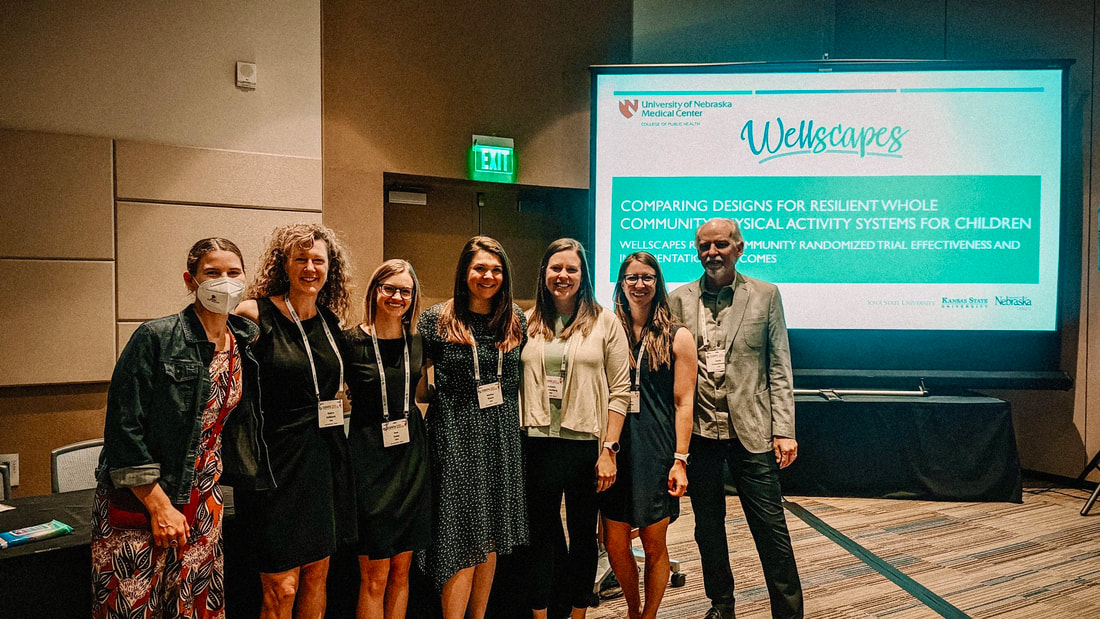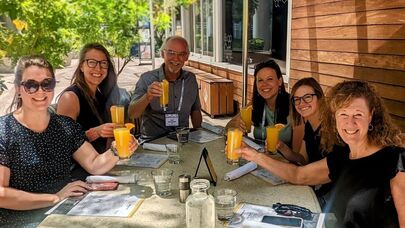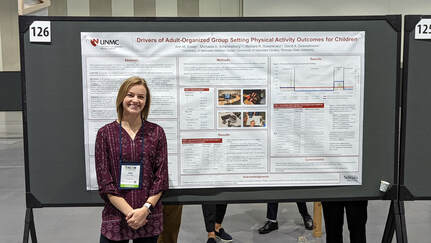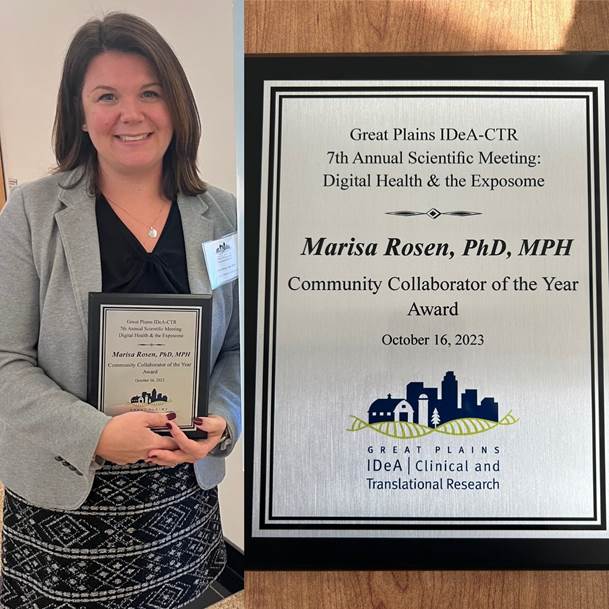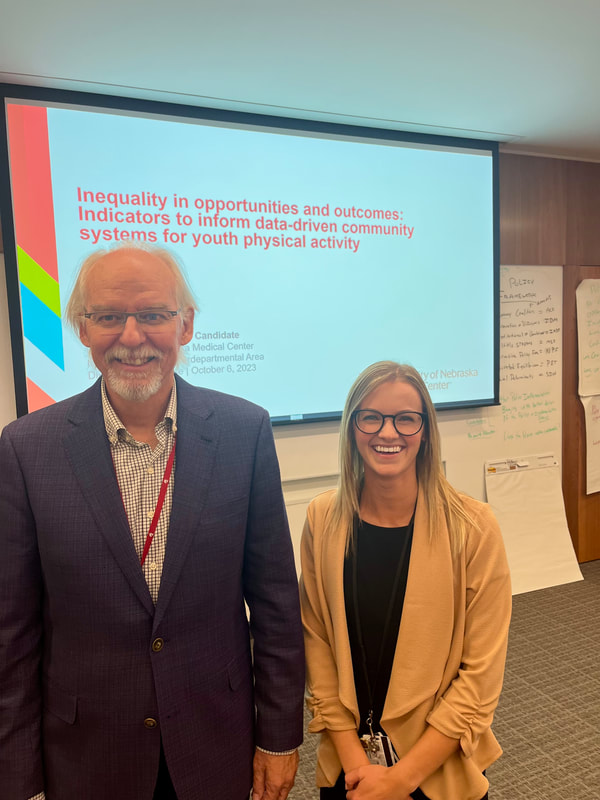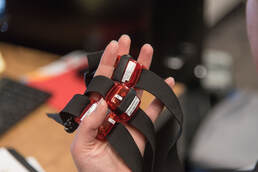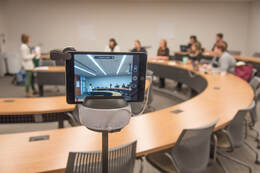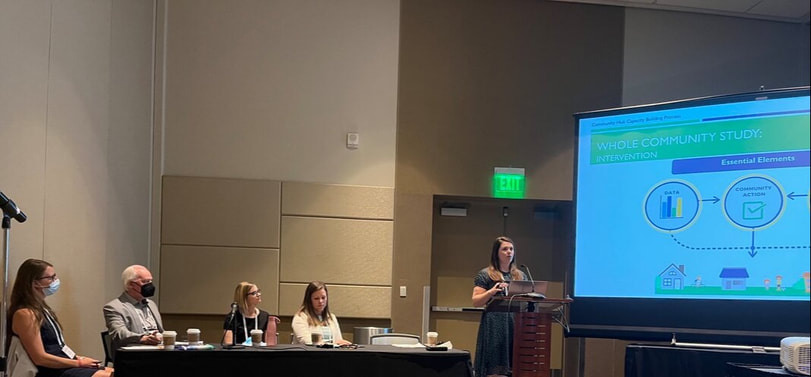
Community Systems Analysis and Development for Population Health Physical Activity and Nutrition
Our work studies local community social, economic, and political systems as a basis for creating the social determinants of health in children. The social determinants of health are the conditions of places where children live, learn, and play. We have developed a community and setting framework for local analysis, planning and collective action that fosters entrepreneurial efforts at social change for the promotion of health behavior.
Breaking work
Our omnibus goal is to answer two questions:
Dr. David Dzewaltowski faciliates a research group working to develope a generalizable approach to conceputalizing and measuring local community-drven system efforts to improve population health through data-driven decision making. The approach is based on building the capacity of local community stakeholders to create an architecture for multi-agent local data-driven decision making to investigate, design, practice, and reflect on community rules and practices. We define rules as rules-in-use (norms) and rules-in-form (written policies and programs). This work was first presented as setting building approach in the early 2000s called the Healthy Youth Places Framework and supported by findings from a middle school randomized trial funded by the National Institutes of Health RO1 HD37367. Several subsequent projects contributing to developing a line of knowledge of social determinants and strategies for improving population health. Current work is contributing to a community building approach called the Wellness Landscape Model (Wellscapes), which is being studied through a community randomized trial funded by the National Cancer Institute of the NIH R01CA215420. ClinicalTrials.gov Identifier: NCT03380143. The content is solely the responsibility of the authors and does not necessarily represent the official views of the National Institutes of Health Comparing Designs for Whole-Community Physical Activity Systems: Wellscapes Randomized Trial
(Click here for video presentation)
COMMUNITY AND CHILD POPULATION HEALTH:
WELLSCAPES RURAL COMMUNITY RANDOMIZED TRIAL EFFECTIVENESS AND IMPLEMENTATION OUTCOMES (Click here for video presentation)
Comparing designs for resilient whole community physical activity systems for children
(Click here for video presentation)
|
Recent Awards
Congratulations to Dr. Marisa Rosen for her award for collaboration with rural communities as part of Wellscapes and Diabetes on Track projects.
Congratulations to Dr. Ann Essay for defending her dissertation studying indicators for measuring inequality of opportunities for physical activity.
|
Community Improvement - Wellness Landscape Improvement Model For Population Health
Wellscapes Model for Community Population Health Improvement
Wellscapes Model for Community Population Health Improvement
- Essay, A. M., Schenkelberg, M. A., Von Seggern, M. J., Rosen, M. S., Schlechter, C. R., Rosenkranz, R. R., & Dzewaltowski, D. A. (2023). A protocol for a local community monitoring and feedback system for physical activity in organized group settings for children. Journal of Physical Activity & Health, 1–9. doi: 10.1123/jpah.2022-0486
- Schenkelberg, M. A., Rosen, M. S., Bavari, A. E., Norgelas, S. J., Rosenkranz, R. R., Welk, G. J., & Dzewaltowski, D. A. (2021). A protocol for coordinating rural community stakeholders to implement whole-of-community youth physical activity surveillance through school systems. Preventive Medicine Reports, 24, 101536.
- Kellstedt, D. K., Schenkelberg, M. A., Welk, G. J., Rosenkranz, R. R., Idoate, R., Ramos, A. K., ... & Dzewaltowski, D. A. (2021). Rural community systems: Youth physical activity promotion through community collaboration. Preventive Medicine Reports, 23, 101486.
- Kellstedt, D. K., Schenkelberg, M. A., Von Seggern, M. J., Rosenkranz, R. R., Welk, G. J., High, R., & Dzewaltowski, D. A. (2021). Youth sport participation and physical activity in rural communities. Archives of public health, 79(1), 1-8.
- Essay, A., Schlechter, C. R., Mershon, C. A., Fial, A. V., Ellison, J., Rosenkranz, R. R., & Dzewaltowski, D. A. (2021). A scoping review of whole-of-community interventions on six modifiable cancer prevention risk factors in youth: A systems typology. Preventive Medicine, 153, 106769.
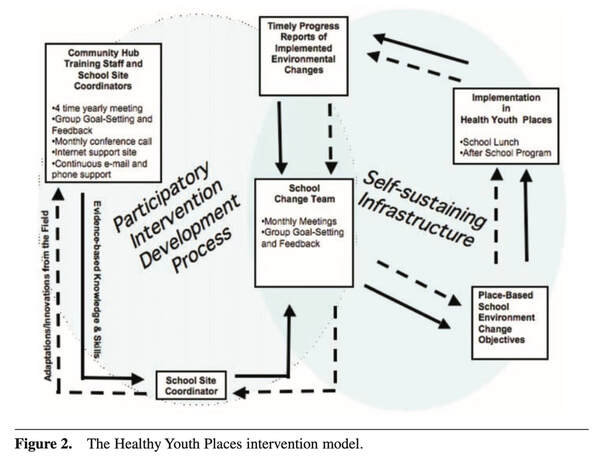
Setting improvement - Healthy Places Model
Original Healthy Youth Places Middle School Model
Example Applications of the Healthy Youth Places Modell
Original Healthy Youth Places Middle School Model
- Dzewaltowski DA, Estabrooks PA, Welk G, et al. Healthy Youth Places: A Randomized Controlled Trial to Determine the Effectiveness of Facilitating Adult and Youth Leaders to Promote Physical Activity and Fruit and Vegetable Consumption in Middle Schools. Health Education & Behavior. 2009;36(3):583-600. doi:10.1177/1090198108314619 (Shown in Figure 2 Above).
- Dzewaltowski, D.A., Estabrooks, P.A., & Johnston , J.A. (2002) Healthy Youth Places promoting nutrition and physical activity, Health Education Research, 17, 541–551, https://doi.org/10.1093/her/17.5.541
- Dzewaltowski, D. A., Estabrooks, P. A., Gyurcsik, N. C., & Johnston, J. A. (2002). Promotion of physical activity through community development. In J. L. Van Raalte & B. W. Brewer (Eds.), Exploring sport and exercise psychology (p. 209–223). American Psychological Association. https://doi.org/10.1037/10465-010
Example Applications of the Healthy Youth Places Modell
- Dzewaltowski, D.A., Rosenkranz, R.R., Geller, K.S. et al. HOP'N after-school project: an obesity prevention randomized controlled trial. Int J Behav Nutr Phys Act 7, 90 (2010). https://doi.org/10.1186/1479-5868-7-90
- Coleman, K.J., Shordon, M., Caparosa, S.L. et al. The healthy options for nutrition environments in schools (Healthy ONES) group randomized trial: using implementation models to change nutrition policy and environments in low income schools. Int J Behav Nutr Phys Act 9, 80 (2012).https://doi.org/10.1186/1479-5868-9-80
- Chen, S., Dzewaltowski, D.A., Rosenkranz, R.R. et al. Feasibility study of the SWITCH implementation process for enhancing school wellness. BMC Public Health 18, 1119 (2018). https://doi.org/10.1186/s12889-018-6024-2
- Dipti A. Dev, D. A. Dev, Irene Padasas, I. Padasas, Carly Hillburn, C. Hillburn, Virginia C. Stage, V. C. Stage, & David A. Dzewaltowski, D. A. Dzewaltowski. (2022). Using the RE-AIM Framework in Formative Evaluation of Ecological Approach to Family Style Multilevel Child Care Intervention. Journal of nutrition education and behavior, , -. doi: 10.1016/j.jneb.2022.03.005
Methods for measuring setting social systems structures and health behavior for population health improvement
To understand and coordinate social system change through data-driven decision making, feedback is necessary to measure the structural conditions of the social system and implementation and health behavior outcomes across many levels (e.g., individual, setting, community, state and national) and time scales (across days, weeks, months and years). Methods below have contributed to the development of easily administered self-report tools that provide information at a broad population level across long time scales. In addition, ongoing development of a method that pairs video observation with health behavior sensors, such as accelerometers, provides information about dynamic place-based processes across short time scales. The physical activity studies below illustrate method development and demonstrate that setting leaders implementation define social structural practices that impact health behavior.
To understand and coordinate social system change through data-driven decision making, feedback is necessary to measure the structural conditions of the social system and implementation and health behavior outcomes across many levels (e.g., individual, setting, community, state and national) and time scales (across days, weeks, months and years). Methods below have contributed to the development of easily administered self-report tools that provide information at a broad population level across long time scales. In addition, ongoing development of a method that pairs video observation with health behavior sensors, such as accelerometers, provides information about dynamic place-based processes across short time scales. The physical activity studies below illustrate method development and demonstrate that setting leaders implementation define social structural practices that impact health behavior.
Episode boundary (start and stop point defined by activity purpose)
- Schlechter, C. R., Guagliano, J. M., Rosenkranz, R. R., Milliken, G. A., & Dzewaltowski, D. A. (2018). Physical activity patterns across time-segmented youth sport flag football practice. BMC public health, 18(1), 226. https://doi.org/10.1186/s12889-018-5108-3 (Shown in Figure above).
- Schlechter, C. R., Rosenkranz, R. R., Guagliano, J. M., & Dzewaltowski, D. A. (2018). Impact of troop leader training on the implementation of physical activity opportunities in Girl Scout troop meetings. Translational behavioral medicine, 8(6), 824-830. https://doi.org/10.1093/tbm/iby091
- Guagliano, J. M., Kolt, G. S., Rosenkranz, R. R., & Dzewaltowski, D. A. (2019). Does self-determined motivation interact with environmental contexts to influence moderate-to-vigorous physical activity during a girls’ youth sport camp?. Journal of sports sciences, 37(23), 2720-2725 https://doi.org/10.1080/02640414.2019.1662537
- Schlechter, C. R., Rosenkranz, R. R., Fees, B. S., & Dzewaltowski, D. A. (2017). Preschool daily patterns of physical activity driven by location and social context. Journal of school health, 87(3), 194-199. https://doi.org/10.1111/josh.12486
- Guagliano, J. M., Updyke, N. J., Rodicheva, N. V., Rosenkranz, S. K., Dzewaltowski, D. A., Schlechter, C. R., & Rosenkranz, R. R. (2017). Influence of session context on physical activity levels among Russian girls during a summer camp. Research Quarterly for Exercise and Sport, 88(3), 352-357. https://doi.org/10.1080/02701367.2017.1331291
- Coleman, K. J., Geller, K. S., Rosenkranz, R. R., & Dzewaltowski, D. A. (2008). Physical activity and healthy eating in the after-school environment. The Journal of School Health, 78(12), 633–640. doi: 10.1111/j.1746-1561.2008.00359.
Implementation science methods for designing studies for translation of research to practice in community settings
As part of the NIH Behavior Change Consortium, Dr. Dzewaltowski was a founding member of the Reach, Effectiveness, Adoption, Implementation and Maintenance (RE-AIM) work group, whose goal has been to improve the sustainable adoption and implementation of effective, evidence-based health promotion programs. He was the PI of a RWJF grant that created the RE-AIM website and dissemination network. The RE-AIM framework stimulated the creation of the field of the health implementation science, and the RE-AIM framework has spread over the last 15 years internationally. In a recent social network analysis of the RE-AIM Framework publications, Dzewaltowski was identified as the 7th highest author in centrality to the spread of RE-AIM across the international network of implementation science researchers.
Social system processes are mediated by cognitive system processes to influence health behavior
Dzewaltowski’s early work was one of the first to study the social system and cognitive systems processes that influence physical activity from a theoretical perspective. He compared several psychology discipline theoretical models and identified self-efficacy as a central social cognitive system process mediating physical activity behavior change. These findings were widely cited and became central to Albert Bandura's books and papers addressing self-efficacy and other social cognitive processes and health behavior theory. Bandura was ranked as the fourth most-frequently cited psychologist of all time and received the national medal of science. He stated "Some researchers have tested whether factors included in alternative conceptions of health behavior add incremental prediction over about a subset of sociocognitive determinants. In several of these studies, the sociocognitive determinants included efficacy beliefs, and satisfaction or dissatisfaction with the changes in achieved heath habits (Dzewaltowski, 1989; Dzewaltowski et al, 1990). Both efficacy beliefs and affective self-reaction to personal progress contributed to adherence to healthful behaviors. Attitude and perceived social pressure similarly accounted for healthful behavior, but they did not improve prediction when added to the subset of sociocognitive determinants. Such findings suggest redundancy of determinants under different names rather than dissimilar determinants. (p., 286, Bandura, 1997)." The work supported adopting a social cognitive approach to health behavior change and later helped direct the field toward addressing intervention development targeting social psychological system processes within a theory-driven mediation/moderation framework.
As part of the NIH Behavior Change Consortium, Dr. Dzewaltowski was a founding member of the Reach, Effectiveness, Adoption, Implementation and Maintenance (RE-AIM) work group, whose goal has been to improve the sustainable adoption and implementation of effective, evidence-based health promotion programs. He was the PI of a RWJF grant that created the RE-AIM website and dissemination network. The RE-AIM framework stimulated the creation of the field of the health implementation science, and the RE-AIM framework has spread over the last 15 years internationally. In a recent social network analysis of the RE-AIM Framework publications, Dzewaltowski was identified as the 7th highest author in centrality to the spread of RE-AIM across the international network of implementation science researchers.
- Dzewaltowski DA, Glasgow RE, Klesges LM, Estabrooks PA, Brock E. RE-AIM: evidence-based standards and a Web resource to improve translation of research into practice. Ann Behav Med. 2004 Oct;28(2):75–80. PMID: 15454353
- Dzewaltowski DA, Estabrooks PA, Glasgow RE. The future of physical activity behavior change research: what is needed to improve translation of research into health promotion practice? Exerc Sport Sci Rev. 2004 Apr;32(2):57-63. PubMed PMID: 15064649.
- Dzewaltowski DA, Estabrooks PA, Klesges LM, Bull S, Glasgow RE. Behavior change intervention research in community settings: how generalizable are the results?. Health Promot Int. 2004 Jun;19(2):235-45. PubMed PMID: 15128715.
- Schlechter CR, Rosenkranz RR, Guagliano JM, Dzewaltowski DA. A systematic review of children's dietary interventions with parents as change agents: Application of the RE-AIM framework. Preventive Medicine, 2016; 91:233-243. PubMed PMID: 27569830
Social system processes are mediated by cognitive system processes to influence health behavior
Dzewaltowski’s early work was one of the first to study the social system and cognitive systems processes that influence physical activity from a theoretical perspective. He compared several psychology discipline theoretical models and identified self-efficacy as a central social cognitive system process mediating physical activity behavior change. These findings were widely cited and became central to Albert Bandura's books and papers addressing self-efficacy and other social cognitive processes and health behavior theory. Bandura was ranked as the fourth most-frequently cited psychologist of all time and received the national medal of science. He stated "Some researchers have tested whether factors included in alternative conceptions of health behavior add incremental prediction over about a subset of sociocognitive determinants. In several of these studies, the sociocognitive determinants included efficacy beliefs, and satisfaction or dissatisfaction with the changes in achieved heath habits (Dzewaltowski, 1989; Dzewaltowski et al, 1990). Both efficacy beliefs and affective self-reaction to personal progress contributed to adherence to healthful behaviors. Attitude and perceived social pressure similarly accounted for healthful behavior, but they did not improve prediction when added to the subset of sociocognitive determinants. Such findings suggest redundancy of determinants under different names rather than dissimilar determinants. (p., 286, Bandura, 1997)." The work supported adopting a social cognitive approach to health behavior change and later helped direct the field toward addressing intervention development targeting social psychological system processes within a theory-driven mediation/moderation framework.
- Bauman AE, Sallis JF, Dzewaltowski DA, Owen N. Toward a better understanding of the influences on physical activity: the role of determinants, correlates, causal variables, mediators, moderators, and confounders. Am J Prev Med. 2002 Aug;23(2 Suppl):5-14. PubMed PMID: 12133733.
- Dzewaltowski DA. Physical activity determinants: a social cognitive approach. Med Sci Sports Exerc. 1994 Nov;26(11):1395-9. PubMed PMID: 7837961.
- Dzewaltowski DA, Noble JM, Shaw JM. Physical activity participation: Social cognitive theory versus the theories of reasoned action and planned behavior. J Sport Exerc Psychol. 1990; 12(4):388-405. PMID: 28796958.
- Dzewaltowski DA. Toward a model of exercise motivation. J Sport Exerc Psychol. 1989; 11(3):251-269. PMID: 28796958.
|
Dr. David A.. Dzewaltowski
Professor Community Chair In Activity, Nutrition, & Obesity Prevention College of Public Health University of Nebraska Medical Center Professor Emeritus Kansas State University "We started rigorous community research in 1999 as part of a National Institutes of Health school randomized trial of how to build healthy youth places. We formed www.healthyplaces.org as a place-based approach to improve the health (physical activity and nutrition) and development of youth. Now we are leading innovation on whole-of-community systems research with new strategy, fostering locally lead efforts to build equitable community opportunities or wellness landscapes (www.wellscapes.org) for youth. This work is funded by the NIH National Cancer Institute." |

Ann Essay, MPH, Ph.D.
Research Coordinator College of Public Health University of Nebraska Medical Center "Our laboratory is investigating community, organization and group processes that drive structural opportunities for improved youth health behavior. We study community-driven practices through rigorous research methods using video observation and objective measurement of health behavior, such as using accelerometers to measure physical activity. By pairing measures of community, organization, and group structures and processes with measures of health behavior, we can establish how community social ecological systems impact the lives of youth, how structures in opportunities impact youth, and what communities can do to provide more opportunities for all children." |
Dzewaltowski Interview on Community Wellness
"Wellscapes is a method for community-driven efforts to build a community landscape of healthy places. A community with a patchwork of different places providing healthy opportunities where children and families go, such as school, after school programs, clubs, faith groups, and youth sport, can provide a local environment to support healthy development and behavior. By using data to drive decision making, embedding community systems change, and providing professional development, communities can combine efforts to create a mosaic of healthy places to live, work, learn, and play. Click on wellscapes.org to signup for the community population health improvement method for children" |
2023-2025
- Wellness Advocacy Zones: Opportunities for Kinship Involvement
- NIH National Heart Lung and Blood Institute
- Indoate, Regina (MPI)
- Maloney, Shannon (MPI)
- Dzewaltowski, David (Co-I)
- Diabetes On Track: Transforming Rural Care and Education
- Diabetes Care Foundation of Nebraska
- Dzewaltowski, David A. (PI)
- Desouza, Cyrus (PI)
- Patient-Clinic-Community Integration to Prevent Obesity among Rural Preschool Children
- Patient-Centered Outcomes Research Institute
- Bailey-Davis, Lisa (PI), Gessinger Health System
- Dzewaltowski, D.A. (Co-I)
- Coordinating Whole-of-Community Systems for Early Life Cancer Prevention in the Great Plains: All Sports for All Kids Project
- Dzewaltowski, D.A (PI)
- Dev, Dipti Co-(PI),
- Rosen, Marisa (C0-PI)
- Whole of Community Systems Intervention for Youth Population Physical Activity
- 1RO1 CA215420-01A1, NIH, National Cancer Institute
- Dzewaltowski, David A. (PI)
- Indigenous Qualitative Inquiry in Implementation Science Community Hub Coalitions in Whole-of-Community Systems Interventions
- 3R01CA21542002S1, NIH, National Cancer Institute
- Dzewaltowski, David A. (PI, Mentor)
- Idoate, Regina (Mentee)
- Increasing Compliance with Physical Education Laws to Reduce Health Inequities
- 1K01HL151805-01A1 NIH, National Heart, Lung, and Blood Institute
- Thompson, Hannah R. (PI)
- Dzewaltowski, David (Mentor)
- Smart and connected childcare communities
- 1952231 National Science Foundation
- Raikes, Abbie (PI)
- Ryherd, E (Co-PI)
- Dinkel, D (Co-PI)
- Dzewaltowski, D.A. (Co-PI)
- Evaluating a Systems-Based Health Intervention for Middle School Wellness
- 1 R21 HD090513-01A1, NIH, NICHD
- Chen, Senlin (PI), Louisiana State University
- Dzewaltowski (Co-I)
- Meal Time Quality and Healthy Eating in Early Child Care
- USDA National Institute of Food and Agriculture and the Nebraska Agricultural Experiment Station
- Dev, Dipti (PI), University of Nebraska, Lincoln
- Dzewaltowski (Co-I, Mentor)
- SensiTray: Improving Feasibility and Validity in Children’s Dietary Assessment.
- NIH P20gM10431 Seed grant, Zempleni, (PI)
- Dev, D. A., (PI)
- Pitla, S (Co-PI)
- Dzewaltowski, D.A (Co-PI)
- Guru, H
- Iowa SWITCH - Dissemination of the Evidence-Based SWITCH® Program for Childhood Obesity Prevention
- 2015-68001-23242, National Institute of Food and Agriculture (USDA)
- Welk, Greg (PI), Iowa State University
SELECTED AWARDS
Distinguished Scientist Award
The Distinguished Scientist Award -- which is sponsored by the chancellor and recognizes researchers who have been among the most productive scientists at the University of Nebraska Medical Center during the past five years -- was awarded to Dr. David Dzewaltowski.
The Distinguished Scientist Award -- which is sponsored by the chancellor and recognizes researchers who have been among the most productive scientists at the University of Nebraska Medical Center during the past five years -- was awarded to Dr. David Dzewaltowski.
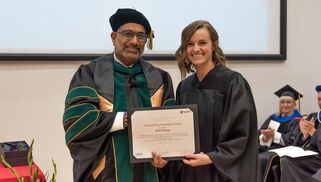
Outstanding MPH Capstone Award
Research Assistant Ann Essay receives the UNMC College of Public Health Outstanding Capstone Award from Dean Ali Khan for her research with Children's Hospital Center for the Child & Community on geographic variability in childhood obesity in Omaha.
Research Assistant Ann Essay receives the UNMC College of Public Health Outstanding Capstone Award from Dean Ali Khan for her research with Children's Hospital Center for the Child & Community on geographic variability in childhood obesity in Omaha.
